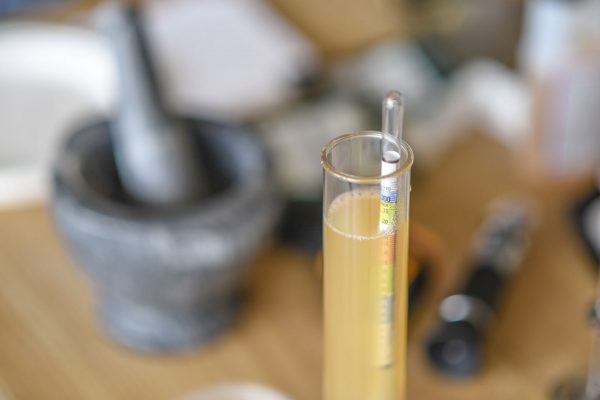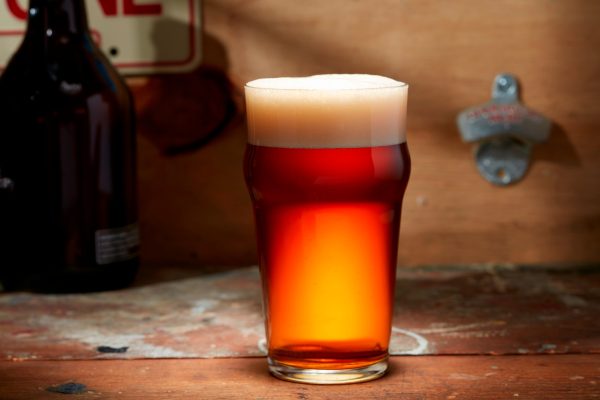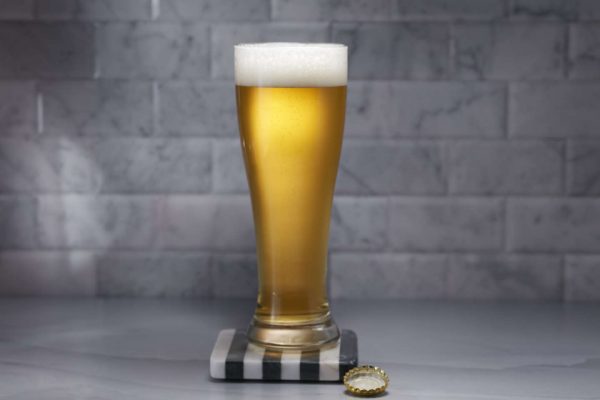
The following beer recipe is featured in the July/August 2004 issue of Zymurgy magazine. Access this issue along with the archives with Zymurgy Online!
This recipe comes from Charlie Papazian's column “World of Worts” in the July/August 2004 issue of Zymurgy magazine.
Maibocks, or helles bocks, are traditionally served in the spring, specifically in May, throughout Germany. Often described as a Munich helles with bock strength, or as a paler take on the classic bock style, Maibocks offer the malty notes and strength characteristic of a bock, along with slightly more pronounced hop aroma than your typical bock.
However, Charlie specifically notes “American homebrewers, be careful. I am not granting you license to over hop this beer.”
With lighter, paler notes, a nice alcoholic strength, and lager crispness, this Maibock is begging to be the start to those warm May nights that lie ahead. Get to brewing this recipe now, and you’ll be glad when you have a cold glass of Jabberwocky Maibock to help chase down a late afternoon spring sunset.
The following beer recipe is featured in the July/August 2004 issue of Zymurgy magazine. Access this issue along with the archives with Zymurgy Online!
This recipe comes from Charlie Papazian's column “World of Worts” in the July/August 2004 issue of Zymurgy magazine.
Maibocks, or helles bocks, are traditionally served in the spring, specifically in May, throughout Germany. Often described as a Munich helles with bock strength, or as a paler take on the classic bock style, Maibocks offer the malty notes and strength characteristic of a bock, along with slightly more pronounced hop aroma than your typical bock.
However, Charlie specifically notes “American homebrewers, be careful. I am not granting you license to over hop this beer.”
With lighter, paler notes, a nice alcoholic strength, and lager crispness, this Maibock is begging to be the start to those warm May nights that lie ahead. Get to brewing this recipe now, and you’ll be glad when you have a cold glass of Jabberwocky Maibock to help chase down a late afternoon spring sunset.
Ingredients:
- 9.0 lb (4 kg) very light malt extract syrup or 7.25 lb (3.3 kg) very light dry malt extract
- 1.0 lb (454 g) Belgian (or other) aromatic malt
- 0.5 lb (225 g) Pilsner malt
- 2.0 oz (56 g) 4.4% alpha German Hallertauer whole hops (60 minutes)
- 2.0 oz (56 g) 5.5% alpha German Hersbuck-Hallertauer whole hops (15 minutes)
- 0.6 oz (14 g) 5.5% alpha Crystal pellet hops (1 minutes)
- 0.3 oz (10 g) 5.5% alpha Crystal pellet hops (dry hopping)
- 0.25 tsp powered Irish moss
- 0.75 cup (180 ml) corn sugar (priming bottles) or 0.33 cup (80 ml) corn sugar for kegging
- German or Bavarian type lager yeast
Specifications:
Yield: 5.5 gallons (21 L)
Original Gravity: 1.066
Final Gravity: 1.014-1.018
ABV: 6.5-7%
IBU: ~30-32
SRM: 7-11
Boil Time: 60
Directions:
Note from Charlie: Because the full volume is boiled, you will see better hop utilization. Less bittering hops are needed to achieve the same bitterness as in the mash-extract recipe. Heat 1.5 quarts (1.4 L) water to 172°F (77.5°C), then add crushed Pilsner and aromatic malts to the water. Stir well to distribute the heat. Temperature should stabilize to about 155°F (68°C). W rap a towel around the pot and set aside for 45 minutes. Have a homebrew. After 45 minutes, add heat to the mini-mash and bring the temperature to 167°F (75°C). Then pass the liquid through a strainer and rinse the grains with 170°F (77°C) water. Discard Grains. Add more water to the sweet aromatic extract you have just created. Bring the volume up to about 3.5 gallons (13L). Add malt extract and 60 minute hops and boil for 45 minutes. The total boil time will be 60 minutes. When 15 minutes remain, add 15 minute hops. When 10 minutes remain, add Irish moss. When one minute remains, add one minute crystal hop pellets. After a total wort boil of 60 minutes, turn off the heat and place the pot in a running cold water bath for 15 minutes. Strain out and sparge hops and direct hot wort into a sanitized fermenter where two gallons (7.6 L) of cold water have been added. Add water if needed to achieve a final volume of 5.5 gallons (21 L).
All Grain Version
Note from Charlie: Because the full volume is boiled, you will see better hop utilization. Less bittering hops are needed to achieve the same bitterness as in the mash-extract recipe.
- 11 lb (5 kg) | Pilsner Malt
- 1.0 lb (454 g) | Belgian (or other) aromatic malt
- 0.25 lb (112 g) | German Sauer (sour) malt
- 1.5 oz (42 g) | 4.4% alpha German Hallertauer whole hops (60 minutes)
- 2.0 oz (56 g) | 5.5% alpha German Hersbuck-Hallertauer whole hops (15 minutes)
- 0.6 oz (14 g) | 5.5% alpha Crystal pellet hops (1 minutes)
- 0.3 oz (10 g) | 5.5% alpha Crystal pellet hops (DRY HOPPING)
- 0.25 tsp | powered Irish moss
- 0.75 cup (180 ml) corn sugar (priming bottles) or 0.33 cup (80 ml) corn sugar for kegging
- German or Bavarian type lager yeast
A step infusion mash is employed to mash the grains. Add 12 quarts (11.5 liters) of water at 145°F (63°C) to crushed grains, stir, stabilize and hold the temperature at 132°F (53°C) for 30 minutes.
Add 6 quarts (6 liters) of boiling water and add heat to bring the temperature to 155°F (68°C) and hold for about 30 minutes.
Then raise the temperature to 167°F (75°C). Lauter and sparge with 3 gallons of 170°F (77°C) water.
Collect about 6 gallons (23 liters) of runoff. Add 60 minute hops and bring to a full and vigorous boil.
Total boil time will be 60 minutes. When 15 minutes remain, add the 15 minute hops. When 10 minutes remain, add the Irish moss. When one minute remains, and the one minute crystal pellet hops.
After a total wort boil time of 60 minutes, turn off the heat and place the pot (with cover on) in a running cold water bath for 15 minutes. Continue to chill in the immersion or use other methods to chill the wort.
Strain and sparge the wort into a sanitized fermenter. Bring the volume to 5.5 gallons (21 liters) with additional cold water if necessary.
Pitch yeast when the temperature of the wort is about 70°F (21°C).
Once visible signs of fermentation are evident ferment at temperatures of about 55°F (12.5°C) for about one week, or when fermentation shows signs of calm and stopping.
Rack from your primary into your secondary and add hops pellets for dry hopping.
If you have the capability, “lager” the beer at temperatures between 35°F - 45° F (1.5°C - 7°C) for three to six weeks. Prime with sugar and bottle or keg when complete.





Share Post